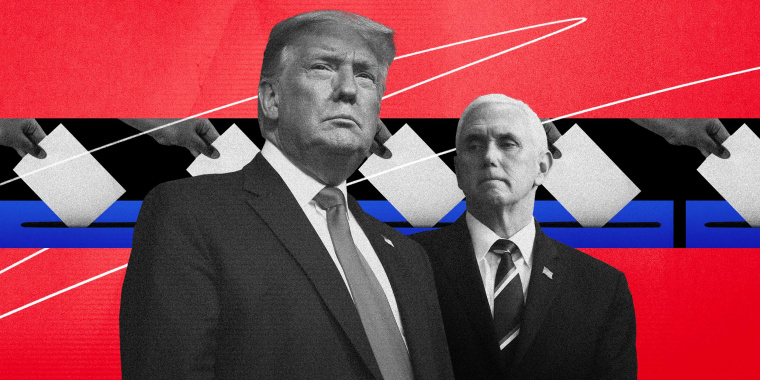The late American author Joanna Russ once wrote that “ignorance is not bad faith, but persistence in ignorance is.” It’s against that backdrop that two separate developments this week concerning the 2020 election ought to be assessed.
The actual legal analysis in the memos is embarrassingly thin and self-contradictory, never mind that they completely ignore the relevant procedural rules.
First was the release of a pair of memos penned by former law professor John Eastman, articulating a six-point plan then-Vice President Mike Pence could have followed after Jan. 6 to swing the election to then-President Donald Trump. The actual legal analysis in the memos is embarrassingly thin and self-contradictory, never mind that they completely ignore the relevant procedural rules. Second was The New York Times report that, as early as mid-November, the Trump campaign knew most of its claims of widespread election fraud were completely bogus — meaning there was no good-faith basis for contesting the results in any state, let alone in enough states to actually have a chance at changing the ultimate result.
What these stories have in common is their complete and utter bad faith. Bad faith on the part of John Eastman, who not only wrote the memos in question, but who also gave a fiery speech at the rally preceding the violence at the Capitol in which, among other things, he contradicted his own logic. And bad faith on the part of the president and his senior campaign team, who, despite knowing how empty their fraud claims were, continued (and, to this day, continue) to air them.
The notion that Eastman, Trump and his campaign team were acting in bad faith is neither new nor surprising. But it’s not just their bad faith that these stories reveal; it’s that of everyone who has supported — and continues to support — them. As Russ put it, ignorance, by itself, is not bad faith — but persistence in ignorance is. And as more and more stories like these continue to make their way into the public domain, the persistence of the former president’s supporters in their ignorance ought to be called out for what it is: it’s their bad faith, too.
Take the Eastman memos. At their core, they attempt to conjure a means by which the Constitution’s 12th Amendment, adopted in 1804 after the messy election of 1800, magically empowers the vice president to unilaterally decide which states have and have not chosen properly certified electors. But the 12th Amendment says nothing of the kind. Indeed, the only time it refers to the vice president’s role in counting electoral votes is when it provides that “[t]he President of the Senate shall, in the presence of the Senate and House of Representatives, open all the certificates and the votes shall then be counted.” That’s it. From there, Eastman not only divines substantive authority to decide whether the certificates are valid, but he also concludes that the Electoral Count Act of 1887 — the statute that actually provides a procedure for resolving disputes over certified electors — is “likely unconstitutional.” Why? Because it violates … the 12th Amendment.
This legal analysis is bad enough. But the memos never stop to wonder whether the underlying result for which they’re advocating is actually a good thing.
This legal analysis is bad enough. But the memos never stop to wonder whether the underlying result for which they’re advocating — that a vice president can unilaterally override the clearly expressed will of the American people — is actually a good thing. It’s just assumed that the goal is to keep Trump in office, whatever the price. All that the memos concede on this front is that Pence’s gambit would provoke “[h]owls, of course, from the Democrats.” As long as the scheme is couched in partisan terms, the fact that it’s also the end of our democratic government is, seemingly, beside the point.
Ditto The New York Times report about the Trump campaign’s fraud complaints. As the Times story makes clear, by Nov. 19, the Trump campaign had prepared a lengthy memo outlining why the outlandish claims being leveled against Dominion Voting Systems and Smartmatic were simply baseless. Although the Dominion and Smartmatic claims were hardly the only fraud claims leveled by Trump and his supporters, they were simply the only ones that, in an alternate reality, could have been widespread enough to sufficiently impact the election results. But in the seven weeks between Nov. 19 and Jan. 6, and throughout the eight months since, these lies were and have been continually reiterated by Trump and his supporters — even though, when testifying under oath in court, the best proof campaign representatives have come up with is that “[w]e have no underlying definite facts that it wasn’t.”
Our system is built on the idea of principled disagreement. The idea of bipartisan cooperation assumes that, even when we differ with our friends and neighbors on policy, we can at least agree that the other side’s view is reasonable — and that compromise is therefore a worthy endeavor unto itself.
What these stories reiterate is that there are simply no remaining good faith disagreements about the result of the 2020 election. There are no good faith factual claims that, if proven, would undermine the basis for President Joe Biden’s victory. And there are no good faith legal claims to the same effect. It’s bad faith, all the way down.
To many — indeed, perhaps to most — this conclusion isn’t a surprise. But with every additional data point, it becomes clearer that those agreeing with these lies and scams bear their own responsibility, as well.

